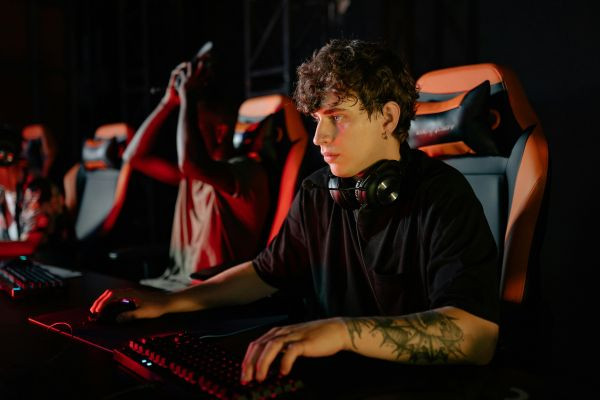Competitive gaming, more popularly known as esports, has become an industry in a decade. From being a niche subculture for enthusiasts and hobbyists, competitive gaming today encompasses millions of p..
11/30/24 • 396 Views
Competitive gaming, more popularly known as esports, has become an industry in a decade. From being a niche subculture for enthusiasts and hobbyists, competitive gaming today encompasses millions of players, fans, and viewers across the globe. What was initially played in the basement LAN parties has evolved into a multi-billion-dollar industry with sponsorships, global tournaments, and college scholarships. Esports is not only changing how people think about video games, but it went on to change everything - entertainment, social dynamics, education, and even traditional sports - globally.
It actually starts tracing roots in the late 1990s and early 2000s with the phenomena of StarCraft, Warcraft III, and Counter-Strike in being the first to popularize competitive gaming on such a global scale. Mainstream recognition did not come until the very tail end of the 2000s and the early 2010s. It was largely because of a series of main launches of serious leagues, the start of stream-orientated networks like Twitch, and fast internet to all.
By then, with games that come to mind are League of Legends, Dota 2, Overwatch, and Fortnite, esports have become part and parcel of mainstream entertainment industries. The competitive nature of these games, coupled with the increasing availability of live streams and online platforms, attracted massive audiences. Today, events like The International (Dota 2), League of Legends World Championship, and CS:GO Major Championships have attracted millions of online viewers as well as filling in massive arenas, with the prize pools competing with those in traditional sports.
The Cultural Influence of Esports and Entertainment
Esports has significantly impacted the global culture because it has been able to bring video gaming into traditional entertainment. Some of the biggest esports tournaments are streamed live on various platforms, including Twitch, YouTube, and Facebook Gaming, and audiences can watch the players live. This has enabled millions of the new digital form of entertainment to be able to follow their favorite players or teams as they compete to win glory, as currently popular esports events garner viewership numbers greater than those found in some of the classic sports events like the Super Bowl and the World Series.
On the other hand, this has furthered the idea of esports in popular culture through various means. Esports players have themselves become celebrities attracting sponsorship deals from big-time brands as well as appearing side by side with mainstream celebrities in media. Twitch brought further ascents to the new "culture of streamers." This "culture" has enabled many users to stream their gameplay, converse with fans, and thereby earn massive followership, in certain cases sometimes even surpassing established entertainers and artists-acting and music-making professionals, respectively.
The Social Influence of Esports
Esports has had a profound impact on how people go about relating to each other. People had always thought that games were nothing social. Esports turned everything around; it transformed gaming, which was once considered some sort of solitary activity, into one that is social and communal in nature. People get together, support their favorite teams, discuss among themselves their victories or share defeats with each other.
But perhaps, more important, it also opens a path to inclusivity and diversity in that players from walks of life play at the top levels. Because esports are international, they bring together gamers, spectators, and competitors worldwide who share an interest in the sport, creating an international community. Women who were once underrepresented in gaming are making their marks in competitive esports thanks to the initiatives that aim at creating more inclusive spaces.
Esports has also helped athletes create the right and sustainable career. Today, professional players can live off sponsorships, winnings, and streaming or be hired as content creators/influencers. To prove this industry's maturity, colleges and universities in North America and Europe now offer programs and scholarships for esports.
Esports and Traditional Sports: The Changing Landscape
Another trend is that esports has merged with traditional sports. Most esports teams resemble a traditional sport team, with a head coach, analysts, and a support staff. Some traditional sport franchises have even joined the fray by partnering with esports teams; for instance, Team Liquid has an NBA franchise, and some other NFL franchise like the Dallas Cowboys has an ownership of some esports teams. This fusion between the two is indicative of gaming being increasingly accepted as a legitimate form of athletic competition.
The physical demands of esports are also increasingly recognized. Professional gamers train for hours daily, honing their skills, learning strategies, and exercising for reflexes and stamina-building activities. Even the structure of esports events mirrors that of traditional sports leagues, with regular seasons, playoffs, and championships.
Impact on Global Culture
Esports continues to shape global culture in new ways for international engagement. Fortnite and PUBG, among many other online multiplayer games, have provided virtual space through which the world's gamers can work in tandem with each other or against each other in real time. It has thus created global communication which transcends language and geographical barriers. Today, major tournaments in esports are broadcast in multiple languages to cover a worldwide audience and to glue fans together around the globe to the passion of the game they are viewing.
Esports promotes innovation in new technologies. In the quest for quality in streaming, high graphics in games, and more connection speed, companies will find new ways to make innovations in gaming hardware and software possible because they are competing against each other to set a benchmark in the world of gaming.
Conclusion: A New Era in Global Culture
A new generation in global culture has risen with the emergence of esports. The niche birth of competitive gaming has evolved into dominating the global entertainment market. Here to stay, it is changing what we see in gaming and its meaning to be an athlete, an entertainer, and a fan in the 21st century.
The future now looks incredibly bright for the world of esports, as more individuals discover the thrill of competition in gaming across the planet. Global culture will change, new social dynamics will emerge, and entertainment will be rewritten to ways that most never thought possible. It is much more than just a game for the casual gamer, for the fanatic fan, or pro player.









